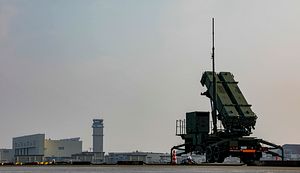U.S. President Donald Trump’s difficulties in understanding the efficacy of missile defenses has been on my mind recently. First, there was his dangerous comment in mid-October that two U.S. ground-based interceptors—each with a laughably high probability of hitting an ICBM of “97 percent”—would definitely be able to protect the United States from a North Korean ballistic missile.
Now, new reporting, citing multiple sources, suggests that Trump said Japan should have attempted to shoot down the North Korean Hwasong-12 intermediate-range ballistic missile launches that flew over Hokkaido on August 29 and September 15. The Wall Street Journal‘s account suggested that Trump may have been joking, but Japan’s Kyodo news agency has a different take, including that the “U.S. president said he could not understand why a country of samurai warriors did not shoot down the missiles.”
I’ll keep it short and simple in this post: the reason Japan does not shoot down North Korean ballistic missiles like the Hwasong-12 is because it cannot shoot down these missiles. The two systems that Japan has procured since the late-1990s for ballistic missile defense, spurred by North Korea’s 1998 flight of the Taepodong-1 satellite launcher over its territory, are Patriot batteries capable of intercepting short- and medium-range ballistic missiles at low altitudes in their terminal phase and Aegis-equipped ship-based interceptors capable of midcourse interception of IRBMs, but provided their location is adequate. (Japan has just four destroyers currently operational, but plans to have eight in the future.)
Neither system would have been able to intercept the Hwasong-12 IRBMs that North Korea launched over Japanese territory. Japan’s land-based Patriot systems would have been able to shoot down debris had the missile failed over Japanese territory. (Such a failure would have occurred outside of the earth’s atmosphere.)
Japan has made investments in considerably more impressive systems that may one day give it a capability against IRBMs. Tokyo has co-developed the SM-3 Block IIA interceptor with the United States, which is expected to see its first deployments in early 2018. The SM-3 Block IIA would give Aegis destroyers a capability against IRBMs. Moreover, Tokyo is considering procuring an Aegis Ashore installation, which would also allow it to intercept these kinds of missiles.
Capabilities aside, interception of a missile that isn’t aimed at Japanese territory may transgress Japanese constitutional limits on self-defense. The missiles North Korea launched in August and September landed outside of Japan’s exclusive economic zone, hundreds of miles away in the northern Pacific Ocean. In light of this and other considerations, Japanese Defense Minister Itsunori Onodera, in October, ruled out Japanese attempts to intercept North Korean missiles unless they constitute an “attack on” Japan. In the end, Tokyo may have also calculated that even if its SM-3 destroyers may be capable of interception under highly specific conditions, the costs of a miss, which would erode the credibility of missile defense, may be too great.
Japanese Prime Minister Shinzo Abe and Trump have been discussing the North Korean threat all year—and certainly those discussions continued this week during Trump’s visit to Japan on his first-ever presidential trip to Asia. As Japan continues to see missile defense as the cornerstone of its strategy for living with the new reality in Northeast Asia of a nuclear-armed North Korea, it is essential that the U.S. president be on the same page.

































